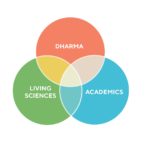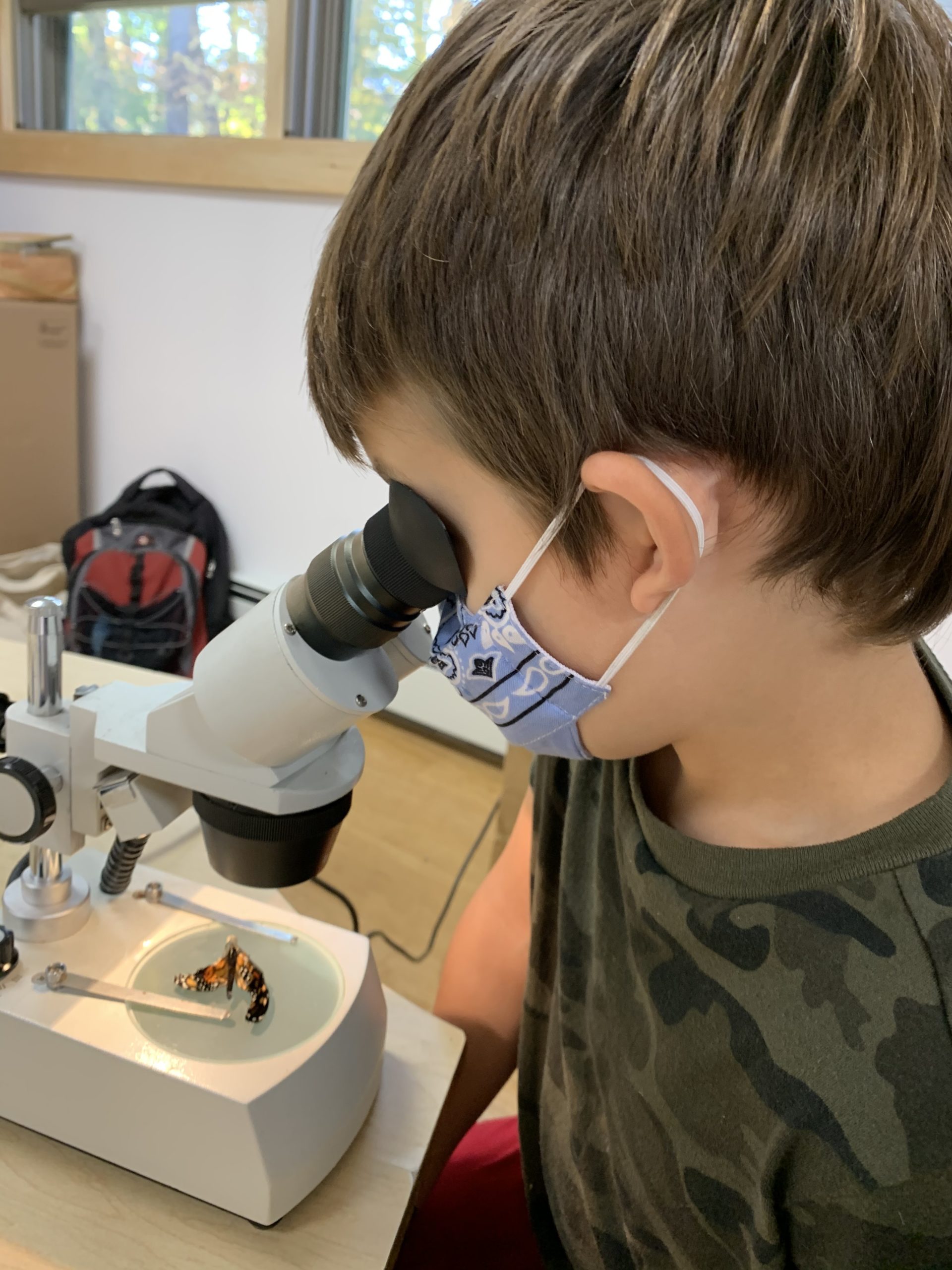CURRICULUM OVERVIEW
The Middle Way School is a center of research for our sister organization, Middle Way Education, exploring how timeless wisdom and methods of the Buddhadharma can enhance a modern, progressive education. We rely on our highly-skilled teachers to innovate in the classroom with the support of three curriculum coordinators and key advisors. Academics, Living Sciences, and Dharma are given equal attention. Together these spheres provide a singularly individualized education that meets children at their precise developmental stage. Children develop a sustained joy in learning. We teach with the understanding that they are whole beings with complex inner lives, complete with an innate awakened mind. Education is not meant to fill them up, but rather to uncover the seeds of wisdom that are already there. By cultivating dignity, discernment, and discipline, students step confidently onto a path of lifelong learning.
“Coming from a competitive school in the city, I wasn’t sure what to expect at a Buddhist school in Upstate New York, was it going to be rigorous enough? Would my child remain on par? I could not be more thrilled to see how fully my child is learning and how confident he has become. He now enjoys reading and his handwriting has improved, he’s doing mental math above his grade level. And on top of that, his genuine kindness is shining through brighter than ever. Thank you!” – S., A Middle Way School Parent
Three Areas of Focus
 At the Middle Way School our three areas of focus are: Academics, Living Sciences, and Dharma. In order to function in a variety of cultural, geographical, and educational environments, the Middle Way Curriculum is designed to be modified. It can be adapted to meet the specific needs of a community, based on these three primary Spheres of Learning, or focus areas. This allows us to weave traditional academic areas with Buddhist teachings while introducing localized themes and study areas. The three areas exist separately and overlap to create an integrated whole that unifies the school program. Dharma is the sphere that must be present for a school to adopt the Middle Way Model. Read more.
At the Middle Way School our three areas of focus are: Academics, Living Sciences, and Dharma. In order to function in a variety of cultural, geographical, and educational environments, the Middle Way Curriculum is designed to be modified. It can be adapted to meet the specific needs of a community, based on these three primary Spheres of Learning, or focus areas. This allows us to weave traditional academic areas with Buddhist teachings while introducing localized themes and study areas. The three areas exist separately and overlap to create an integrated whole that unifies the school program. Dharma is the sphere that must be present for a school to adopt the Middle Way Model. Read more.
Standards
The Middle Way School relies on innovative education research and highly-skilled teachers to provide an individualized education. We refer to three sets of standards to guide the academics at our school: The New York State Common Core Standards; Learning for Justice; and the Cloud Institute’s Education for Sustainability Standards. Our developmental approach to teaching and learning allows conventional subjects to be taught in ways that matter to students. Throughout the study of texts and numbers, play, contemplation, and exploration, students are encouraged to use inquiry as the foundation for academic achievement.
Developmental Stages
Being attuned to the developmental stage of each child’s body, speech, and mind is essential to the practice of teaching in a meaningful way. Middle Way organizes learning into 5 stages based on children’s chronological ages and developmental stages. Teachers are given time and support to cultivate their own practice so that they are able to meet children where they are.
THEMATIC UNITS
The Middle Way School organizes the academic year by thematic units. Each unit has a flexible duration of 1 week to 2 months and is designed so that it can be adapted to suit the structure of a variety of learning environments, whether it be a school or a camp or even at home.
One of the beautiful things about the dharma is that almost anything can become an entry point for understanding. There are countless pathways to approach the truth. For simplicity’s sake, Middle Way selected 8 themes drawn from traditional Buddhist practice and study that seem most fertile for student inquiry.
- Taking Your Seat
- Refuge
- Bodhicitta
- Impermanence
- Cause and Effect
- Lineage
- Interconnection
- Harmony
DOMAINS OF LEARNING
 The Five Domains of Learning are areas of study that ensure a well-rounded education. The Five Domains are: Sciences; Humanities; Arts; Embodiment; and Contemplation. Contemplation includes social and emotional learning. These Domains of Learning are aligned with the five elements (water, earth, fire, air, and space) and, on a subtle level, include the wisdom energies of the Tibetan Buddhist mandala. Teachers use the domains to plan curricula so that children experience a balance of all Five Domains throughout the week.
The Five Domains of Learning are areas of study that ensure a well-rounded education. The Five Domains are: Sciences; Humanities; Arts; Embodiment; and Contemplation. Contemplation includes social and emotional learning. These Domains of Learning are aligned with the five elements (water, earth, fire, air, and space) and, on a subtle level, include the wisdom energies of the Tibetan Buddhist mandala. Teachers use the domains to plan curricula so that children experience a balance of all Five Domains throughout the week.
We extend our deep gratitude to Dee Joy Coulter, Marti Holley, Kristin Lhatso, and Steven Sachs for their work on the Five Domains of Learning in its earliest form at Eastern Sun Academy in Boulder, Colorado.
RHYTHM OF THE DAY
The school day is 8:40 a.m – 3:15 p.m. We start our mornings outdoors with a run through the back woods and some warming movement. Each class then spends some time getting grounded and settled using mindful breathing and songs in morning circle. From there, the daily rhythm is a balance of active and quiet, indoor and outdoor, independent and group activities. We have blocks for math and literacy, social studies, unfettered time and daily classroom care taking. And of course recess. Children spend a minimum of 1.5 hours outdoors. There is a half hour specialty class each day after lunch in which children engage in music, art, Sanskrit, aikido, parkour, theater, or percussion. Parents are welcome to use our Buddha hall for yoga or meditation after drop off. Friday afternoons are optional. From 1-3 PM students are outdoors or doing longer arts and movement projects. Snow Lions (ages 3-4) nap after lunch.
OUTCOMES
Using the current best practices in progressive education, Middle Way aims for a high level of academic achievement while supporting students’ social-emotional wellbeing, confidence and love of learning. The early years at MWS focus on honing innate qualities such as awareness, discernment, respect, curiosity, non-aggression, non-judgment and a sense of the sacred. They learn to trust their judgement and to be their own teachers, to question, debate, and articulate their beliefs.
These qualities prepare students to engage in study of Buddhist history, philosophy, logic, and practice from the perspective of different lineages and traditions. Whether or not they choose to practice or to label themselves as Buddhists, the education encourages students to face the world with curiosity and compassion, dignity and confidence, and a healthy amount of playfulness.
We intend to create and environment in which our students can become connected, actively-involved, life-long learners, with a great capacity to manifest for the benefit of themselves and others. Considerable time has been put into developing a comprehensive list of outcomes, which we encourage you to read more about (link below).
DHARMA FUNDAMENTALS
A Middle Way graduate will be able to speak articulately about the fundamentals of Buddhism and have familiarity with the basic practices. They will have an appreciation of the teachings of the Buddha and understand how to apply them to daily life. Our aim is to present the various traditions as fully as possible, not blending them but celebrating the differences and commonalities, and becoming knowledgeable in all the ways that the Buddha’s teachings have been incorporated into human experience.
GRADE LEVELS
2019-2020
Preschool and Pre-K
Mixed-Grade Kindergarten and 1st Grade
Mixed-Grade 2nd and 3rd
2020-2021
Fawns: Age 3
Snow Lions: Ages 4-5
Wild Horses: Ages 5-6
Ravens: Ages: 6-7
Dragons: Ages 7-8
Owls: Ages 8-10
2021-2022
Nursery – 5th Grade
2022-2023
Nursery – 6th Grade
Future
Middle School
High School

